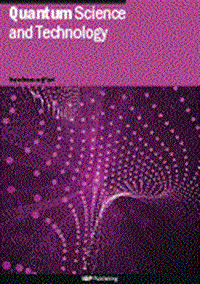Application-level benchmarking of quantum computers using nonlocal game strategies
IF 5
2区 物理与天体物理
Q1 PHYSICS, MULTIDISCIPLINARY
引用次数: 0
Abstract
In a nonlocal game, two noncommunicating players cooperate to convince a referee that they possess a strategy that does not violate the rules of the game. Quantum strategies allow players to optimally win some games by performing joint measurements on a shared entangled state, but computing these strategies can be challenging. We present a variational quantum algorithm to compute quantum strategies for nonlocal games by encoding the rules of a nonlocal game into a Hamiltonian. We show how this algorithm can generate a short-depth optimal quantum strategy for a graph coloring game with a quantum advantage. This quantum strategy is then evaluated on fourteen different quantum hardware platforms to demonstrate its utility as a benchmark. Finally, we discuss potential sources of errors that can explain the observed decreased performance of the executed task and derive an expression for the number of samples required to accurately estimate the win rate in the presence of noise.使用非局部博弈策略的量子计算机应用级基准测试
在非局部博弈中,两个不交流的玩家合作说服裁判他们拥有一个不违反游戏规则的策略。量子策略允许玩家通过在共享纠缠态上执行联合测量来最佳地赢得一些游戏,但计算这些策略可能具有挑战性。通过将非局部博弈的规则编码为哈密顿算子,提出了一种计算非局部博弈的量子策略的变分量子算法。我们展示了该算法如何为具有量子优势的图形着色游戏生成短深度最优量子策略。然后在14种不同的量子硬件平台上对该量子策略进行评估,以证明其作为基准的实用性。最后,我们讨论了潜在的错误来源,这些错误可以解释所观察到的执行任务性能下降,并推导出在存在噪声的情况下准确估计胜率所需的样本数量的表达式。
本文章由计算机程序翻译,如有差异,请以英文原文为准。
求助全文
约1分钟内获得全文
求助全文
来源期刊

Quantum Science and Technology
Materials Science-Materials Science (miscellaneous)
CiteScore
11.20
自引率
3.00%
发文量
133
期刊介绍:
Driven by advances in technology and experimental capability, the last decade has seen the emergence of quantum technology: a new praxis for controlling the quantum world. It is now possible to engineer complex, multi-component systems that merge the once distinct fields of quantum optics and condensed matter physics.
Quantum Science and Technology is a new multidisciplinary, electronic-only journal, devoted to publishing research of the highest quality and impact covering theoretical and experimental advances in the fundamental science and application of all quantum-enabled technologies.
 求助内容:
求助内容: 应助结果提醒方式:
应助结果提醒方式:


